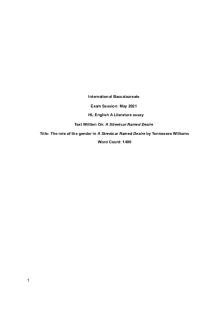A Streetcar Named Desire - essay 1 PDF

| Title | A Streetcar Named Desire - essay 1 |
|---|---|
| Author | Sahr Rasol |
| Course | English Literature - A2 |
| Institution | Sixth Form (UK) |
| Pages | 2 |
| File Size | 44.3 KB |
| File Type | |
| Total Downloads | 79 |
| Total Views | 171 |
Summary
An essay on 'A Streetcar Named Desire'....
Description
To what extent would you describe ‘A Streetcar Named Desire’ as a tragedy? In literature, the genre of tragedy is usually defined by abysmal events encountered or caused by the protagonist of the story. This protagonist is often of a noble status and possesses a fatal flaw; a trait they are unable to overcome which inevitably leads to their tragic downfall. In tragedy, they deal with a conflict (that they will eventually be defeated by in some way). Often a protagonist is seeking catharsis or trying to fix their lives in an attempt to return it to the way it previously was before the conflict. It can be argued that ‘A Streetcar Named Desire’ is a tragedy due to the progression that the protagonist of the play, Blanche DuBois, goes through in the story. Williams portrays Blanche as fitting the conventional role of a protagonist in a tragedy; she is no longer, but previously was, a member of a noble family. Due to this it is possible for her to plummet from her high status to an uncontrollable downfall. The conflict in the play that Blanche is faced with is her loss of status due to unstoppable change around her; she longs to once again be a Southern belle and live the lifestyle of luxury she used to. However, due to the changes in the world around her she is unable to do so, she states she has, ‘oldfashioned ideals’. After the economic and industrial changes during the time period, Blanche would have been unable to restore her family plantation ‘Belle Reve’ to its former glory. Blanche realises that the only way for her to live the life she seeks would be through finding a husband who is financially stable; although, Blanche hasn’t had much luck with marriage in the past. She now seems to see love as purely ‘brutal desire’. Her previous husband, Allan, her first and only true love, committed suicide due to Blanche’s ‘disgust’ of him. This can be seen as the start of her downfall and the cause of her deteriorating mental health. This is later reinforced though the play by the loss of her wealth and her encounters with Stanley, the antagonist of the play, who she sees as a ‘brute’ who is ultimately responsible for pushing her over the edge. The fatal flaw that Blanche seems to possess is her vanity which causes her to constantly lie to those around her. We see this throughout the story; she claims that she doesn’t, ‘Tell the truth, [but rather] what ought to be truth’. A prime example of this is her lying about her drinking habits - when asked if she would like another drink she replies ‘No, one’s my limit’. This suggests that her pride gets in the way of her being able to tell the truth about her issues with alcohol; she feels that if people find out it would damage her reputation as a southern belle. Moreover, even when first arriving to Stella and Stanley’s home the first thing she does if find and drink some alcohol. She then proceeds to ‘carefully replaces the bottle and washes out the tumbler at the sink’. Here Williams is suggesting that Blanche not only hides the truth from others but also herself; she prefers to live in denial so she can uphold the delusional happiness she pretends to have. Furthermore, another aspect that Blanche’s vanity causes her to lie about is her age. She’s unable to handle the fact that she’s aging and still all alone with no status or wealth to show for all her years of life. Blanche feels that she is ‘fading now’ so she must lie to maintain her youth and the illusion that nothing has changed, that she’s still the high born lady she once was. She exclaims to Mitch: ‘I don’t want realism — I want magic!’ This illuminates to the audience the extent to which Blanche is unable to cope with reality; she makes things up to continue living in her ideal (but imaginary) world....
Similar Free PDFs

A Streetcar Named Desire Revision
- 29 Pages

A Streetcar Named Desire Scene 1
- 2 Pages
Popular Institutions
- Tinajero National High School - Annex
- Politeknik Caltex Riau
- Yokohama City University
- SGT University
- University of Al-Qadisiyah
- Divine Word College of Vigan
- Techniek College Rotterdam
- Universidade de Santiago
- Universiti Teknologi MARA Cawangan Johor Kampus Pasir Gudang
- Poltekkes Kemenkes Yogyakarta
- Baguio City National High School
- Colegio san marcos
- preparatoria uno
- Centro de Bachillerato Tecnológico Industrial y de Servicios No. 107
- Dalian Maritime University
- Quang Trung Secondary School
- Colegio Tecnológico en Informática
- Corporación Regional de Educación Superior
- Grupo CEDVA
- Dar Al Uloom University
- Centro de Estudios Preuniversitarios de la Universidad Nacional de Ingeniería
- 上智大学
- Aakash International School, Nuna Majara
- San Felipe Neri Catholic School
- Kang Chiao International School - New Taipei City
- Misamis Occidental National High School
- Institución Educativa Escuela Normal Juan Ladrilleros
- Kolehiyo ng Pantukan
- Batanes State College
- Instituto Continental
- Sekolah Menengah Kejuruan Kesehatan Kaltara (Tarakan)
- Colegio de La Inmaculada Concepcion - Cebu













